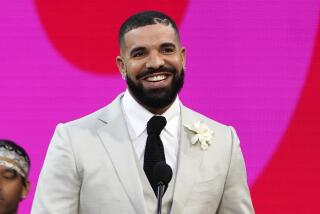How the Chemical Brothers turned answering-machine poetry into dance-floor epics
The first sample that the Chemical Brothers locked down when building their new record, “No Geography,” made its way into the present from the far end of a long-disconnected telephone line.
The recording was taken from a 1972 two-LP collection of spoken pieces recorded as part of a “dial-a-poem” art project. Featuring lines uttered by Michael Brownstein from his poem “Geography,” the album was compiled from artist John Giorno’s answering-machine poetry line, which was listed in New York directories around that time.
The sample captured the down-pitched voice of Brownstein speaking as if from atop a mountain: “If you ever change your mind about leaving it all behind, remember: No geography.”

“It’s such an interesting idea that you would call a phone and you would get poetry,” the Chemical Brothers’ Tom Rowlands said during a recent conversation about the 10 new tracks he made with longtime collaborator Ed Simons.
Responsible for a series of turn-of-the-century records that helped define electronic dance music in America, the Chemical Bros. have survived the oft-fickle tastes of beat culture, to say nothing of the challenges of remaining in a creative partnership, across nearly 25 years. Along the way they’ve pushed an agenda that marries modernity with a sense of history. They’ve co-opted snippets of work from artists ranging from Joeski Love and Odetta to Lothar & the Hand People and Pierre Henry.
For their ninth studio album, Rowlands and Simon set to harnessing bits and pieces from poet Brownstein’s “Geography” and another work on “The Dial-A-Poem Poets,” one of a series of albums issued across the 1970s and ’80s. For “Got to Keep On,” they swipe from treacly Boomer poet Rod McKuen.

Rowlands spoke to The Times in advance of the Chemical Brothers two-night run in Los Angeles, which begins on Wednesday at the Shrine Expo Hall and continues on Thursday at the Greek Theatre. The interview has been condensed and edited.
What drew you to work with the “Dial-A-Poem” series?
I came across it on Ubuweb, which is this amazing resource. Basically every interesting avant-garde thing ever made seems to have wound up there. I read the blurb and it was such an interesting idea.
The first one I heard was by Diane Di Prima — “Revolutionary Letter #49.” When we heard “free yourself, free me,” and then the cutting out a little at the end, we felt like, “Wow, that’s something I want to hear on the dance floor in a musical context.”
The strength of the voice, the way it’s intoned is so brilliant and the words are amazing. That was one of the first pieces of music that we got going for the record. We thought, “OK, that’s something we’re excited about. It feels like something that we want to hear today.”
What was it about those particular works that resonated?
With Michael Brownstein’s “Geography,” it was just hearing those words. I love the digging and I’ve always loved the recontextualizing — putting something in a completely different time and space. You give it a fresh meaning.

It took ages to get to both Michael Brownstein and Diane Di Prima and to get their permission to do it. But it was so beautiful with Michael Brownstein when we sent him the music.
He got back to us through email about how hearing his words put into this new framework gives it a whole new meaning.
There’s magic in that.
Yeah, and a lot of times with samples you get into replaying them or getting someone else to remake them. Sometimes that can be cool and it works. But sometimes it’s the sound of what that voice was like in that room, at that moment, with that energy that’s in the original recording. That’s part of the magic. When you put it into a fresh perspective, something interesting happens.
+++
The Chemical Brothers
When: Wednesday, 8 p.m.
Where: Shrine Expo Hall, 665 W. Jefferson Blvd.
Tickets: $59.50
+++
The Chemical Brothers
When: Thursday, 8 p.m.
Where: Greek Theatre, 2700 N. Vermont Ave.
Tickets: $20.00-$124.50
For tips, records, snapshots and stories on Los Angeles music culture, follow Randall Roberts on Twitter and Instagram: @liledit. Email: randall.roberts@latimes.com.
More to Read
The biggest entertainment stories
Get our big stories about Hollywood, film, television, music, arts, culture and more right in your inbox as soon as they publish.
You may occasionally receive promotional content from the Los Angeles Times.







